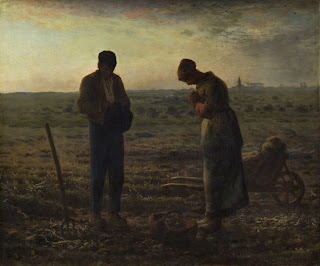The Work of Christ, the Body of Christ
"Some believe it is only great power that can hold
evil in check, but that is not what I have found. It is the small
everyday deeds of ordinary folk that keep the darkness at bay. Small
acts of kindness and love. Why Bilbo Baggins? Perhaps because I am
afraid, and he gives me courage."
J.R.R. Tolkien
It has been a hectic couple of weeks for the Fellowship, and, unfortunately, we missed posting on Corpus Christi and the Visitation in the scramble. So I will try to make up for our omission here.
First, we had a successful and encouraging meeting with a couple who are starting a community in
eastern Kentucky. Bishop Stowe put us in contact with them for support and advice, and they were very encouraging and helpful.
 |
| The Angelus Jean-Francois Millet, 1859. |
Over the weekend Carrie and I attended a conference on permaculture, hoping to glean information on sustainable living and natural agriculture. While we came away with a good starting place for what agriculture in the Community might look like, we came separately to the same conclusion. Permaculturists want to create a "permanent culture," one which is not going to consume itself. But it felt empty. There was no substance, no spiritual center, it was only a desperate attempt to preserve they knew not what. It was a rootless idea of culture.
It contrasted with the Rule of our holy father Benedict, where the communal life and labor grows around an absolute centre: the rule of prayer. "Begin every good work with prayer." St Benedict knows what he is preserving:
"This, then, is our resolve: to never turn away from the Lord's teaching, but to put every good word of his into practice, sticking with our brothers and sisters until we die. Such patience, we know, will lead us to share in Christ's sufferings, but we trust it will also make us worthy to share in his kingdom." (Prologue, trnsl. Wilson-Hartgrove)
Every work faces this centre. The service of God is its purpose and goal. If we are responsible with our resources, if we are generous with our produce, it is as a participation in the life of Christ, acting corporately as his body. This is why St. Benedict places three things together: obedience to Christ, loyalty to the community, and sharing in his suffering. They are all what it means to be Christ's body. I was struck by the fact that the permaculturists could find reasons to do much of this and that it still rang hollow. The Incarnation is what gives shape and meaning to our ethical behavior.
We make this mystery present in the sacrament of the Eucharist. The central act of Christianity. Remembering that God made he who knew no sin to be sin on our behalf so that we might become the righteousness of God (II Cor. 5:21). Christ took on our flesh and even "became sin" to reconcile us to God, so that "those who eat my flesh and drink my blood will abide in me and I in them" (Jhn. 6:56).
This we celebrate on Corpus Christi, the Incarnation of our lord to participate in our flesh, his crucifixion and death to sin and then rising to "live unto God," in which we also participate through baptism (Rom. 6:3-11). This participation in Christ's life and death, this joining to his body, this moral and physical resurrection, is what unifies us and makes us one body. It is what makes us a community.
.jpg) |
| The Last Supper Mosaic Basilica di San Marco, 13th century |
On Tuesday I presented a paper on the use of the verb כִּפֶּר (kipper), usually translated "to atone," in the prophets and psalms. But in biblical poetry this isn't linked with atonement rituals the way it is in Leviticus. Rather, it is linked with ideas of redemption, even ransom. In Isaiah God uses Egypt as Israel's ransom when Pharaoh is overwhelmed in the chaos of the sea (Isa. 27). This redemption from exile informs the New Testament's understanding of our reconciliation through Christ's body. In Christ's blood those who were far from God are brought near, making us no longer strangers, but citizens with the holy ones, joined together in one household, one Body. Ransomed from death, reconciled to God, bought with a price to be servants of God (I Cor. 7:23).
This is our great purpose, the strength through which we work and the goal toward which we work. Christ incarnate, Christ crucified, Christ raised and seated at the right hand of Power, is the means, the substance, and the end of all our effort. Unified by his heroic labor in his body in order to join his labor as his body.
What a blessed feast of our ransom is Corpus Christi. Even if we are a few days late.



Comments
Post a Comment